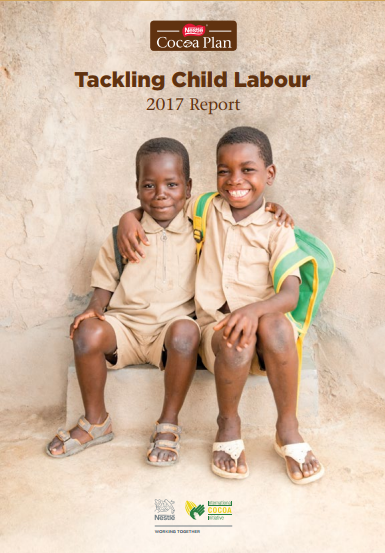According to a 2013/2014 study conducted by Tulane University commissioned by the US Department of Labour, an estimated two million children are engaged in hazardous work in Côte d’Ivoire’s and Ghana’s cocoa industries.
With cocoa being a key ingredient for many Nestlé brands, including global favourites like KitKat® and Nesquik®, the way in which Nestlé sources cocoa is strongly linked to both our business success and our impact on society.
For Nestlé, high-quality, sustainable cocoa sourcing must include a robust approach to tackling the problem of child labour.
Nestlé is firmly opposed to all forms of child exploitation and are committed to preventing and eliminating child labour wherever it occurs in their supply chain. Following the limited impact of previous measures to address child labour in cocoa, in 2011 Nestlé partnered with the Fair Labour Association (FLA) to look into the issue. One of the recommendations in the FLA’s comprehensive report was to set up a Child Labour Monitoring and Remediation System (CLMRS).
Following these recommendations, Nestlé became the first company in the cocoa industry to begin comprehensively tackling the issue through their own CLMRS, introduced as part of the Nestlé Cocoa Plan in 2012.
Initially centred in Côte d’Ivoire, the scope of Nestlé efforts broadened in 2016, when they extended the CLMRS to Ghana. Reporting on their progress in Ghana will begin in 2018.
Since its launch, the system has allowed Nestlé to drill down into the part of the supply chain covered by the Nestlé Cocoa Plan to identify all children actively engaged in child labour or perceived to be at risk of it. This has been a challenging, but worthwhile task. It has allowed Nestlé to take a more robust and systematic approach to the issue than has been seen elsewhere in the industry to date.
Nestlé approach is entirely integrated into their supply chain, and is led by their Confectionery Strategic Business Unit as a way of improving the way they do business. This reflects Nestlé fundamental business philosophy – creating value for society alongside value for the company.
This first report provides an honest account of their efforts to spearhead the food and beverage industry’s approach to what is a highly complex and persistent issue.
Through adopting an open and realistic reporting approach, Nestlé hopes that their insights will help other organisations respond effectively to the issue. In this regard, they have worked with other cocoa and chocolate companies within Cocoa Action, the World Cocoa Foundation’s strategy for cocoa sustainability, and are pleased that the CLMRS approach is fully integrated into its design.

